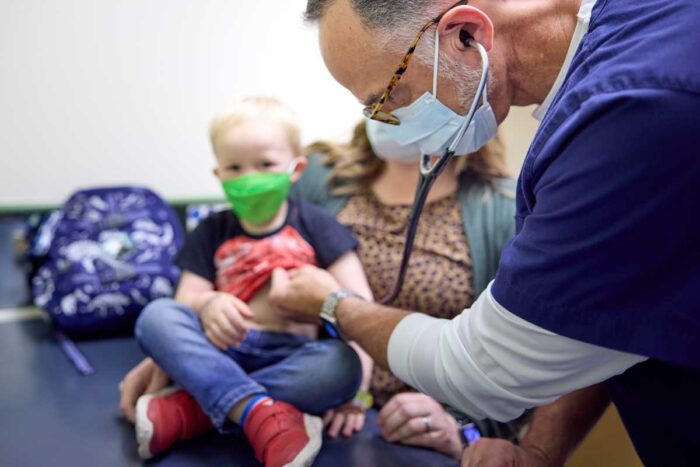WashU network of pediatric, primary care physicians growing across region
Washington University Clinical Associates network includes 23 practices with 116 health-care providers
 Matt Miller
Matt MillerAdam Eaton, MD, sees patient Sawyer Gullett, 3, at Blue Fish Pediatrics in Des Peres, Mo., on Nov. 9. Blue Fish Pediatrics is a member of the growing Washington University Clinical Associates (WUCA) network, which includes 23 practices with 116 health-care providers.
Washington University School of Medicine in St. Louis is known worldwide for its excellent specialty-care physicians, but people much closer to campus may be unaware that the school also offers a growing network of exceptional pediatric and primary care physicians in communities across the St. Louis region.
Launched in 2004 with one adult internal medicine practice, the Washington University Clinical Associates (WUCA) network now includes 23 practices with 116 health-care providers, including doctors, nurse practitioners and physician assistants.
With Missouri locations as far west as Wentzville and as far south as Arnold, WUCA offers patients the opportunity to obtain primary care closer to their homes as part of a close-knit network that provides easy referrals to Washington University specialists and BJC HealthCare’s network of hospitals.
Designed from the start as a flexible and supportive partnership, the arrangements offer community-based doctors the benefits of becoming WUCA employees while also maintaining leadership and managerial oversight over the day-to-day operations of their practices.
“Washington University Clinical Associates is dedicated to providing primary care physicians with the business infrastructure and administrative support necessary to ensure their community-based practices remain successful,” said Paul J. Scheel Jr., MD, vice chancellor for clinical affairs and CEO of Washington University Physicians, the school’s faculty practice, and president of WUCA.
“There’s a shortage of primary care physicians across the nation, especially in underserved areas.” Scheel said. “These WUCA partnerships are helping primary care physicians to stay in their local markets, to invest in and grow their practices and to continue providing vital front-line health care to patients living nearby.”
Jeannette St. Aubin, assistant vice chancellor for clinical affairs and executive director of practice development at the School of Medicine, helped launch the first WUCA partnership in 2004 as a way to retain key primary care practices affiliated with the academic campus.
The program has grown steadily over the years, primarily in pediatric primary care, in partnership with BJC HealthCare and St. Louis Children’s Hospital. WUCA recently added its first general obstetrics & gynecology practice and plans to continue to expand this service in the community in the near future.
WUCare, one of the practices in the WUCA network, is solely dedicated to providing high-quality primary care to Washington University employees and their families (ages 18 and older) who are enrolled in the university-sponsored health plan (United Healthcare).
“A lot of employees may think that finding a Washington University primary care doctor is difficult, but WUCare makes it convenient for university employees and their families to get an appointment,” St. Aubin said.
“WUCA doctors have access to our specialists, which makes it easier for them to coordinate care or make referrals when needed,” St. Aubin said. “These connections also open up opportunities for our medical students and residents to gain pediatric and primary care experience with local community-based practices.”
Adam Eaton, MD, a pediatrician with Blue Fish Pediatrics in Des Peres, Mo., said the major advantage of WUCA affiliation “is that we are allowed to run our practices and serve our communities in ways that work for each individual practice. WUCA has not tried to create its own large top-down system but rather has formed a professional association with talented practices embedded all over the region.”
“We spend our days providing well care and sick care for children, but also helping those children access other medical services when needed,” said Eaton, a St. Louis native who graduated from Washington University School of Medicine and completed his pediatrics residency at St. Louis Children’s Hospital.
An assistant professor in clinical pediatrics, Eaton said the WUCA affiliation has made it much easier for Blue Fish patients to access services offered by St. Louis Children’s Hospital.
“A child might have an illness that requires the full range of care, from an outpatient office to the intensive care unit,” he said. “Having this affiliation with Washington University and St. Louis Children’s Hospital allows us, as the child’s primary care doctors, to provide those patients access to the best care our region has to offer.”
Jonathan N. Byrd, MD, a primary care internist with Grant Medical Clinic in the city’s Central West End, said WUCA was the launching point for his journey as a practicing internal medicine physician.
“As a resident, I was able to train at Grant Medical Clinic,” Byrd said. “I fell in love with not only the opportunity to serve a truly diverse group of patients reflective of the St. Louis region and beyond, but also the group and WUCA’s commitment to quality care.”
Byrd, a clinical associate professor of medicine at Washington University, said WUCA’s commitment to physician growth and flexibility allows his clinic to cater to the care style and interest of each physician.
“I am able to engage broadly in academic teaching of primary care through the residency program, which is important to me,” Byrd said. “WUCA has allowed me to follow my passion of patientcentric care and evidence-based medicine in the setting of a community clinic. This is coupled with tremendous collaboration with leading physician specialists, many of whom are the very same mentors I learned from during my training at Washington University.
“The camaraderie that has pervaded Washington University medical school from my time as a medical student, through residency, and now in practice is alive and well, and I feel WUCA has allowed me to not only benefit from that continued commitment but also pass it along to future practitioners.”






